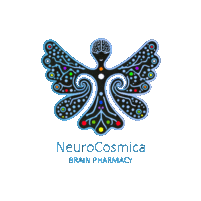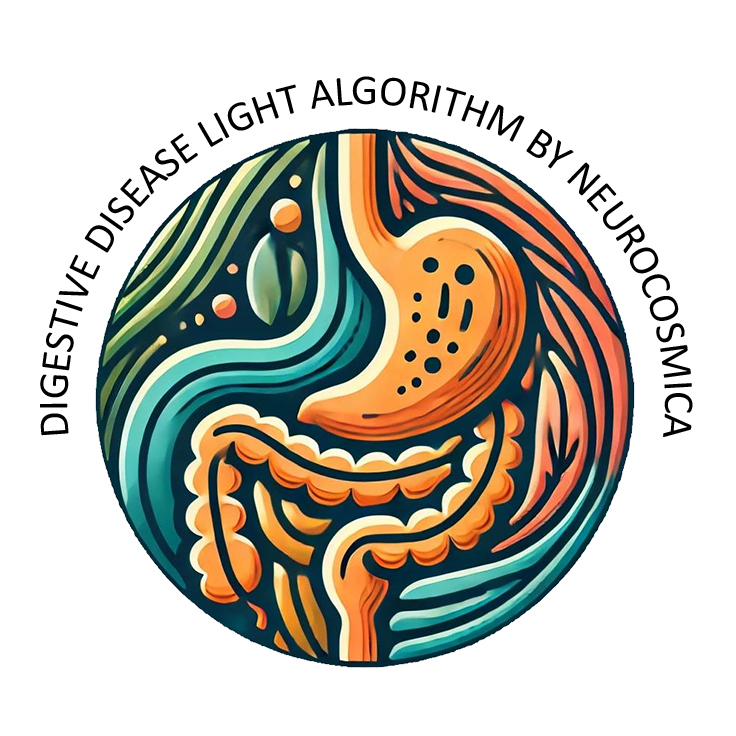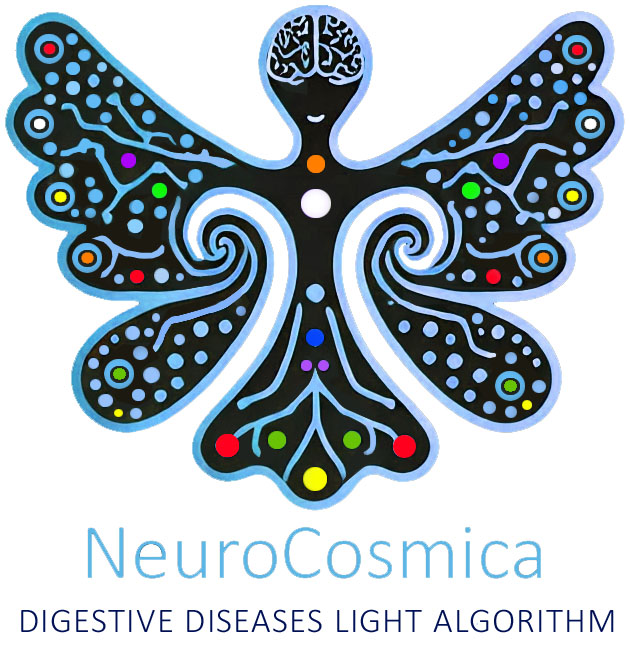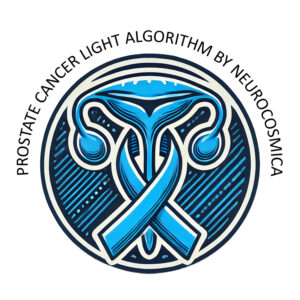NeuroCosmica: Digestive Diseases Light Algorithm
Brief Description of Digestive Diseases: Digestive diseases encompass a wide range of conditions affecting the gastrointestinal (GI) tract, including irritable bowel syndrome (IBS), inflammatory bowel disease (IBD) such as Crohn’s disease and ulcerative colitis, gastroesophageal reflux disease (GERD), and celiac disease. Symptoms can vary but often include abdominal pain, bloating, diarrhea, constipation, heartburn, and nausea.
Causes of Digestive Diseases: Several factors can contribute to the development of digestive diseases:
- Genetics: Family history can increase the risk.
- Diet: Poor dietary habits, including high intake of processed foods, fats, and sugars.
- Infections: Bacterial, viral, or parasitic infections can cause or exacerbate digestive issues.
- Autoimmune Reactions: In conditions like celiac disease and IBD, the immune system attacks the GI tract.
- Stress: Psychological stress can worsen symptoms and trigger flare-ups.
- Lifestyle Factors: Lack of physical activity, smoking, and excessive alcohol consumption.
Recommended Diet for Individuals with Digestive Diseases: A balanced diet can support overall health, reduce inflammation, and improve digestive function. Here are some dietary recommendations:
- High-Fiber Foods: Include plenty of fruits, vegetables, whole grains, and legumes to promote healthy digestion and prevent constipation. Foods rich in soluble fiber, such as oats, apples, and carrots, can be particularly beneficial.
- Probiotics: Consume probiotic-rich foods like yogurt, kefir, sauerkraut, and other fermented foods to support gut health and maintain a healthy balance of gut bacteria.
- Lean Proteins: Choose lean sources of protein such as fish, poultry, beans, and legumes. Fatty fish like salmon and mackerel are rich in omega-3 fatty acids, which can help reduce inflammation.
- Healthy Fats: Include healthy fats from sources like olive oil, avocados, nuts, and seeds to support overall health and reduce inflammation.
- Hydration: Drink plenty of water to stay hydrated and support overall bodily functions. Proper hydration is crucial for maintaining digestive health.
- Avoid Trigger Foods: Identify and avoid foods that trigger symptoms. Common triggers include spicy foods, fatty foods, caffeine, alcohol, and certain artificial sweeteners.
- Small, Frequent Meals: Eat smaller, more frequent meals to help manage symptoms and prevent overeating, which can exacerbate digestive issues.
- Low-FODMAP Diet: For those with IBS, following a low-FODMAP diet can help reduce symptoms by avoiding certain carbohydrates that are poorly absorbed in the intestines.
- Anti-Inflammatory Foods: Include foods with anti-inflammatory properties, such as turmeric, ginger, and green leafy vegetables, to help reduce inflammation in the GI tract.
- Gluten-Free Diet: For individuals with celiac disease, it is essential to follow a strict gluten-free diet to avoid triggering symptoms and damage to the intestines.
NeuroCosmica: Potential Benefits of Light Algorithms for Digestive Diseases
1. Reducing Inflammation: Light algorithms can use specific colors like blue and green to reduce inflammation in the digestive tract, providing relief from symptoms and promoting healing.
2. Alleviating Pain and Discomfort: Light therapy can help alleviate abdominal pain and discomfort associated with digestive diseases, providing relief and improving overall comfort.
3. Enhancing Mood and Reducing Stress: Managing digestive diseases can be stressful. Light therapy with calming colors such as blue and violet can help alleviate stress and promote relaxation, which can positively impact overall well-being and digestive health.
4. Improving Sleep Quality: Sleep disturbances are common in individuals with digestive diseases. Light therapy can help regulate circadian rhythms and improve sleep quality, leading to better rest and overall health.
5. Boosting Energy Levels: Fatigue is a common issue in digestive diseases. Light therapy can boost energy levels, helping individuals feel more active and engaged in their daily activities.
6. Promoting Emotional Balance: Emotional stability is crucial for managing digestive diseases. Light algorithms can help regulate emotions, preventing mood swings and fostering a balanced emotional state.
7. Enhancing Mental Clarity and Focus: Managing the demands of digestive diseases can cause stress and affect cognitive functions. NeuroCosmica’s light therapy can enhance mental clarity and cognitive functions, making it easier to stay focused and productive.
8. Encouraging Positive Mindset: A positive mindset can significantly impact the well-being of individuals with digestive diseases. Light therapy can promote feelings of optimism and resilience, helping them approach their condition with a positive attitude.
9. Creating a Positive Environment: Using light therapy to create a serene and uplifting environment can enhance overall satisfaction and comfort, helping to manage digestive diseases more effectively.
Integrating NeuroCosmica’s Light Algorithms into the care plan for individuals with digestive diseases can provide a unique and effective approach to enhancing their overall well-being. The holistic benefits of light therapy address various aspects of health, helping to reduce inflammation, support emotional balance, improve mood, and ultimately improve the quality of life for those managing digestive diseases.
Important Note: Remember that NeuroCosmica treatments and/or recommendations should not replace the recommendations, treatments, and prescriptions of your doctor, specialist, psychologist, or other professional currently treating you.





Reviews
There are no reviews yet.